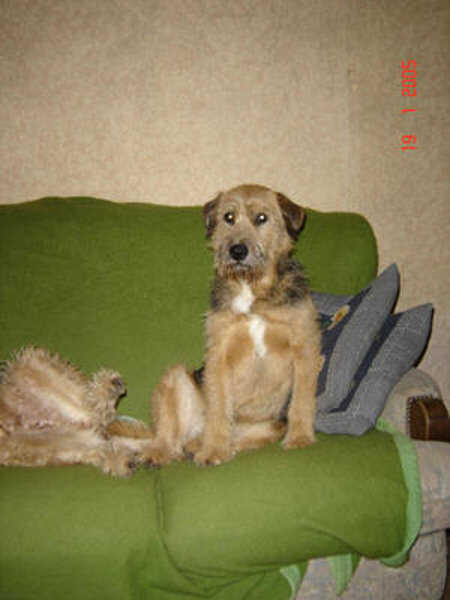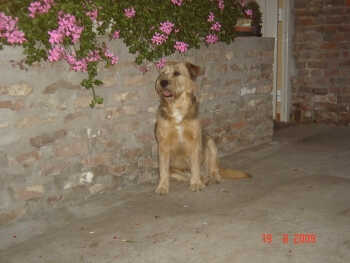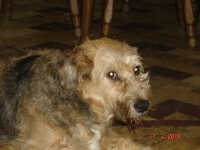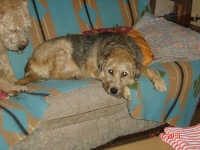|
You came into the world with your sister Tania and your brother Boby, following an accident between your mother Canaille and your father Rambo. The people who had booked for you cancelled, so you stayed with us and became my little Bijou. 10 years of happiness followed.
You adapted very well to the whole family. This life of happiness and love began for you, with food on time, a home to take shelter in, and as much petting as you wanted. I think, seeing all the love I received from you, that I managed to make you happy. Every opportunity was good to show me your joy, and of course the reward was my caresses and a little cookie that you adored. Often, when I was sitting on the couch, you'd come and sit by my side, snuggled up in my arm. When I'd say, “You're making love to your daddy”, you'd sit up a little and put your cheek against mine, and we'd have a cuddle session that sometimes lasted for hours. In the evening, you'd come and snuggle up to me, your head on my arm. You'd stay like that all night long, sometimes coming down because you were too hot, but you'd keep coming back to me. It was often a rivalry with Milou, so sometimes I'd have you both against me, so it's no wonder that some days I slept badly. And then Chouchou left on his cloud, so you had all the room in the world to yourself. Fortunately, she didn't take up much space. And then Rambo left, followed by Tonton, so there were four of us. Then it was Canaille's turn to leave us on July 23, 2009.
Life went on without a hitch until about 1 month ago. You suddenly had swollen glands in your neck and a few small ones next to your udders. So we took some blood and swabs. I was delighted when the vet told me that your blood test was perfect. But that joy was soon turned to sadness when the results of the samples came back: they were cancerous lymphomas. An operation was out of the question, and chemo wouldn't have cured you anyway. After discussions with the vet, we decided that, failing a cure, we would try to keep you pain-free for as long as possible. So you started a palliative cortisone treatment. I was so afraid you'd start to suffer, but you were always like before, going to the garden to relieve yourself, sometimes even running with the others. But that damn cancer didn't leave you in peace, it progressed very quickly, and in two days you changed completely. On Saturday, you wouldn't eat your kibbles any more, but you would eat patties and ham. I immediately sensed that something serious was going on. On Sunday your meals were the same, but fortunately you didn't seem to be in any pain, even though your belly was a little more swollen than normal. That Sunday evening wasn't as usual, so I had to help you onto the bed. As usual, you snuggled into my arm, but kept your eyes open. I held you tighter, and then our eyes met and locked. In a few moments, 10 years of happiness flew by, your eyes so soft and mysterious. After drying my tears, I looked into your eyes again, and there I understood what those beautiful eyes were telling me : you were telling me that you felt the pain would soon be felt, I understood in your beautiful eyes that you were saying goodbye and thanking me for having loved you so much. Little did I know that this was our last hug. The next day, Monday February 22, 2010, you got up as usual but didn't want to eat or drink. I looked into your eyes again and then I understood that you wanted to go and meet your mom on her cloud, you lay down and didn't take your eyes off me, and from time to time you wagged your tail, you were relaxed and not in pain.
I phoned the vet and carried you to bed. I snuggled up to you, stroked you and cried my eyes out. Then the vet arrived. Your pretty eyes closed and then you opened them again to bid me a final farewell and say thank you with a gentle wag of your tail. You faded away in my arm, cheek against cheek, your loving eyes gone forever. I wrapped you in a blanket and held you close to my heart, feeling your body warm against me, but no longer alive. Like all the other loulous, you now rest in my secret garden, you'll have pretty flowers, I'll visit you every day with tears in my eyes and then with time... The sadness will go... but you'll stay in my heart forever. You'll always be my little Mamour de chouchoute who gave me so much friendship, so much love with a sincerity I've never known in a human being. I still have the love of your brother and sister, and of little Canelle whom you didn't know very well. None of them will take your place in my heart, I'll never forget you, you're gone too, taking a corner of my heart with you. I know, in a few months, a few years... but I loved you so much my little hairy girl, I also have your photo in front of my computer and it seems to me, like Chouchou and Canaille, that you're saying to me : It's not your fault Francis, I'm crying too, where I am, to be separated from you, but our hearts remain united for life (the one you have left without me). I beg you my dad, never forget me, you were my breath of life and if I could have a second life, it's with you that I would spend it, I really had a happy life with you, alas much too short. Farewell my lifelong friend, please don't cry, I'm no longer here to console you, so do me this favor, when you look at my photo, give me a smile... If you can... Don't forget that I really loved you, keep hoping that one day, in heaven, we'll meet again and nothing will separate us. |
|
|
The void you'll leave when you leave me will never be filled.
|
|
|
|












 English (United Kingdom)
English (United Kingdom)